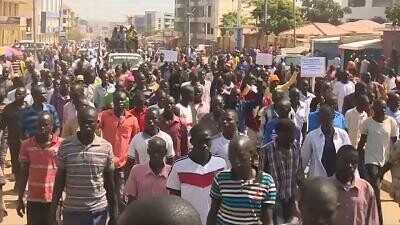The power and ability of citizens to cause change is enshrined in the constitution, though many do not exercise this option.
Activist Edward Khamis is a change agent and activist, he works daily to push back on government excesses. He says all he wants is more citizens to back him up and push the South Sudanese government to be a government of the people for the people.
"I am sure that one day a popular uprising will take place against the ruling regime and change the situation,” he said.
Khamis says he and other activists are opening the dialogue on the rights of citizens to demonstrate, push back the government, and even carry acts of civil disobedience that have proved effective elsewhere in forcing power elites to listen and act.
Demonstrating is one of the means used by people across the world to pressure their governments into changing a certain policy that citizens see as harming their interests and the interests of the country.
The demonstration is a legal right guaranteed by the constitution to the citizen because it is considered as one of the means of expressing public opinion. However, in the situation of South Sudan, this right is almost indigestible because the government resorts to using force and intimidation.
The question that arises is, can South Sudanese citizens one day take to the streets to express their opinion about government policies, or will the policy of silence remain?
Radio Tamazuj reached out to some South Sudanese citizens and across the country to hear their views about this move. Sarah Gabriel said she is not happy with the rising prices of commodities, noting that the economic situation in the country is very bad, especially the high prices that affected all kinds of necessary commodities in the markets.
Gabriel called on the government to intervene quickly to change the economic situation in the country, adding that in light of the government's continued silence, citizens will demand a change of government by going out to the streets and demanding their rights.
Civil activist Edward Khamis said that he expects one day that the South Sudanese people will take to the streets and demand a change of the current regime that led to tribal rivalries between local communities.
The activist stated that the government failed politically, which led to the emergence of voices calling for change for a better tomorrow and future, pointing out that the country since independence has entered into perpetual chaos and economic disruption as a result of the greed of senior politicians.
He said, “Politically, South Sudan has been engulfed in conflicts in all its regions of Equatoria, Upper Nile and Bahr el Ghazal. This is due to the government's failure to unite different ethnic groups, which led to the chaotic situation in the country, so the change must take place to save the country.
“If a citizen sees that he does not live in a suitable situation, he or she will seek change because man by nature always seeks to achieve a new and better life. One day a major revolution will be seen calling for regime change in South Sudan,” he said.
Reverend William Jada Daniel, Dean of the Grace Theological College of the Presbyterian Church said that they, as clergy, always seek to spread messages of peace and reconciliation among all components of the people.
He appealed to the concerned authorities to work to control security and stability in the country, pointing out that the absence of peace and stability in the country has caused the deterioration of economic conditions.
The religious leader called on the government to expedite the implementation of the revitalized peace agreement because it is the only hope of the citizens.
Mayen Jeremiah, head of the Generations Party and a member of the Higher Committee for the Implementation of the Peace Agreement, said that demonstration is a legal right, and this right is guaranteed to anyone.
"But demonstration at this time is not appropriate because the government is in the phase of implementing the peace agreement and the government has now taken steps towards holding elections in order to achieve permanent stability in the country," Mayen said.
The Acting Head of the Constitution Review Committee, William Othwon, said that protest is a constitutional right, but it is one of the restricted rights. He explained that before a demonstration could take place, there are procedures that precede it, such as informing the authorities.
“Demonstration remains a legal and constitutional right guaranteed to all citizens because it is one of the means of expressing an opinion. It will however remain restricted by laws and regulations so that it does not lead to instability,” he concluded.




